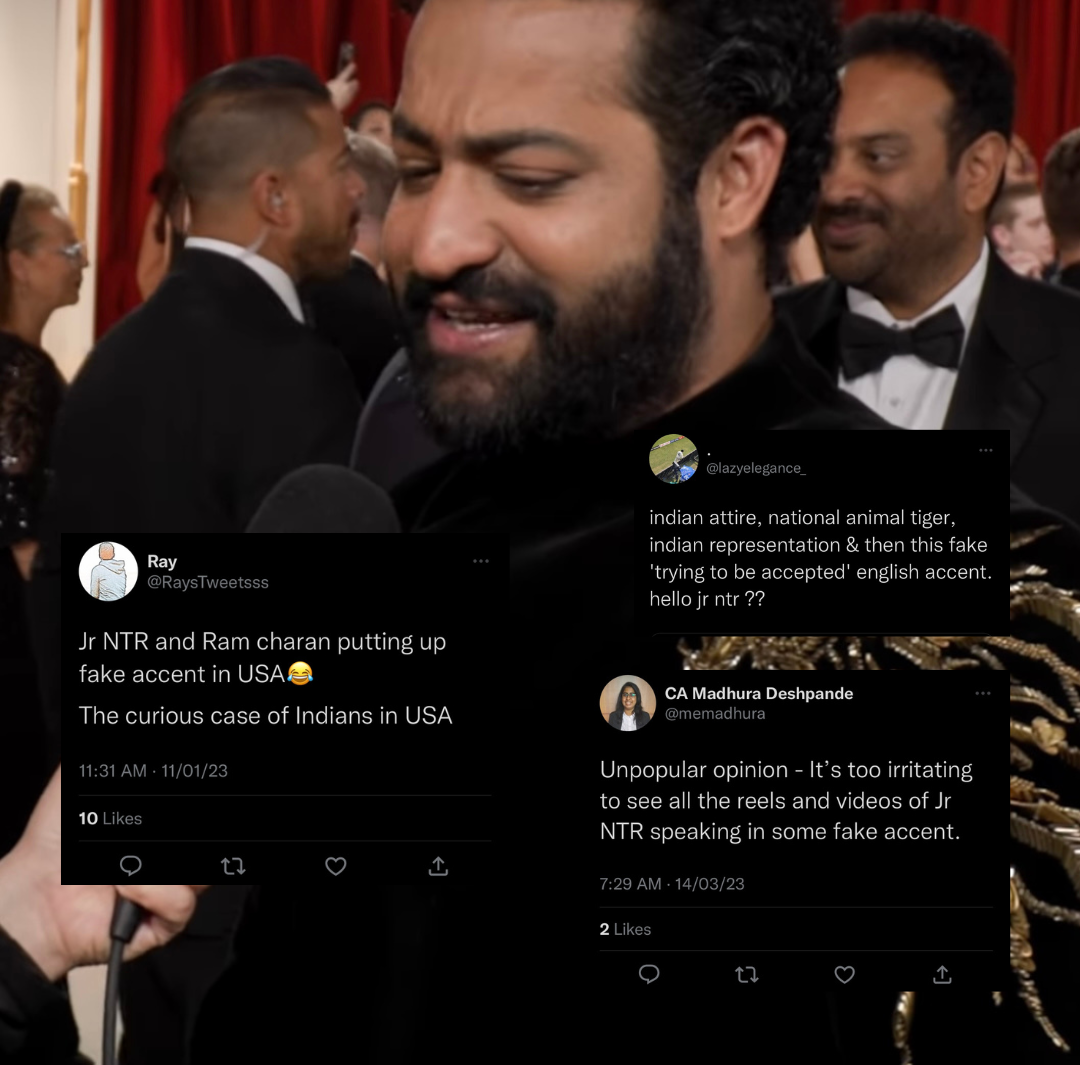Notice: Undefined property: stdClass::$error in /var/www/html/wp-content/themes/theissue/inc/misc.php on line 71
Representing RRR at the 95th Academy Awards and the Golden Globes, actor Jr NTR gave several confident, well-articulated interviews about being a part of a huge milestone for Indian cinema. But the internet community noticed one thing different about him – his accent.
According to the comments on Instagram and Twitter, he seems to have slipped into a more Americanised manner of speech. Videos comparing his accent back home to his new one at the award ceremonies surfaced quickly. On the other hand, Deepika Padukone received praise for continuing to speak the way she does in India.
Is Jr NTR's accent inspired by Priyanka Chopra's? ?
— Sapna Madan (@sapnamadan) March 14, 2023
So, why did he use a ‘fake accent’? To impress the Hollywood greats he was rubbing shoulders with, seemingly overnight? To seem more sophisticated, intelligent, or dare I say, white? While we don’t know his thought process for sure, these reasons could be partially true, but severely misinterpreted.
What Jr NTR did is called code-switching. In linguistics, it means switching between two or more languages or accents to match the social context and communicate better. This is especially true for multilingual immigrants, and it could happen both consciously and unconsciously. Many people don’t even realise when they slip into a different accent. Why is it that immigrants are able to speak differently with the people they study or work with, but can often adopt their native accent with family back home? It’s a way to assimilate better with both groups of people.
NPR’s blog on race titled ‘Code Switch’ covered stories and experiences that people had with the phenomenon. One person of Japanese descent, who had grown up in Los Angeles, recounted unconsciously slipping into English while visiting Japan because she was in a situation where she felt scared. It is also often a conscious response to feeling uncomfortable, especially during conflict.
Although, code-switching is perfectly normal even outside of extreme situations. The desire to fit in and assimilate is among the most natural experiences. We all do it with big or small behavioural changes. The only difference is that an alteration in speech or dressing is far more obvious and harder to conceal.
Language and its connection to race and ethnicity has a huge impact on social standing and acceptance. Multilingual folks may often feel undermined or not taken seriously for speaking in their native language around those who don’t know it. That’s not at all surprising, considering the racist intolerance towards non-European languages that they face. The abundance of videos of white people telling immigrants to “speak English” in the USA and UK should be testament enough of the need to code-switch. Research even shows that in the workplace, racial minorities might be seen as more professional and can escape stereotypes when they code-switch. Another study also showed that companies are more likely to hire candidates who code-switch. The research calls it “résumé whitening”.
Even former US President Barack Obama felt the need to code-switch during his campaign and tenure. There were differences in how he addressed audiences of particular races and nationalities. This practice helped him connect with varied groups of people in a way that they would best relate to. One video from 2012 showed how he shook hands with a white assistant coach differently than how he greeted NBA star Kevin Durant.
On the other hand, like with Jr NTR, people who code-switch face hostility from members of their race for “acting white”. When Priyanka Chopra first made her foray into Hollywood with Quantico, she faced similar backlash. Her American English in the show and the interviews that followed as she rose to global fame drew attention and judgement from those who were accustomed to her Indian accent in Bollywood movies. She even received criticism from peers in the industry. On Koffee With Karan, Kareena Kapoor Khan confessed she’d like to ask Priyanka “where she got her accent from”.
With both Jr NTR and Priyanka Chopra, people perceived their accents as embarrassment about where they come from. The implication that the stars taking India to an international platform would want to seem less Indian is uncomfortable. In reality, though, it’s simply a way to be heard, seen and get by in an environment that is different and intimidating. Representing India on a global stage with few others to keep you company comes with big challenges – but also smaller ones, where just fitting in counts for a lot more than one might believe.




